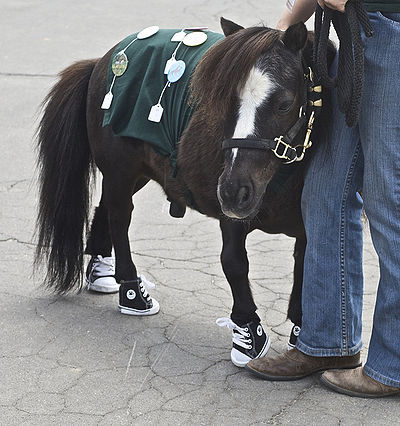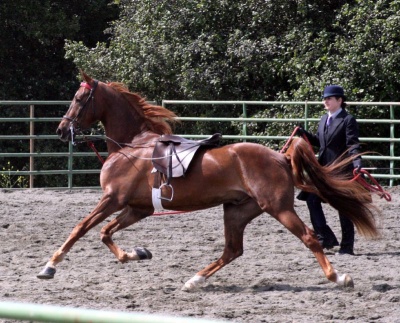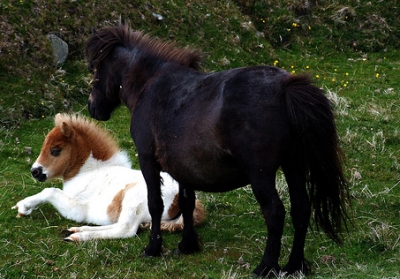
The Miniature Horse owes its development to the Shetland Pony. Selective breeding of the smallest Shetlands created the Miniature Horse. In the 17the century they were bred as pets for children of royalty. In the late 18th century, they were used to work in coal mines until breeders took an interest in them.
Minis as they are affectionately called, require almost the same care as large horses. Because of their size they require less space and less food.
People have a tendency to overfeed minis, causing obesity. Adult minis weigh approximately 250 lbs. Their daily hay consumption should not exceed 3 1/2 lbs. Obesity can cause numerous health problems and should be treated seriously.
Dwarfism is a problem in breeding minis. Some severe deformities result while others can live normally.
Dental problems can arise due to overcrowded teeth in smaller heads. The size and number of teeth are the same as large horses. Periodic dental checkups are very important to avoid other health difficulties.
Sinus infections often occur because of overcrowded tooth roots. If there is facial swelling below the eye or the eye(s) is tearing, call the vet.
Colic is another problem, the cause related to an inability to chew their food well.
When a mini stops eating for any reason such as illness, stress, losing weight too quickly, Hyperlipemia should be suspected. If the body thinks it is starving, fat store are released into the bloodstream and find their way to the liver. This can be fatal if not treated quickly with IV fluids (glucose and insulin).
There is a high incidence of dystocia (difficult birth) because of small pelvic size. A vet should be present when a Mini foals to aid if any complications occur. There is also a higher incidence of aborting a fetus in Minis than in full-size breeds.
Eclampsia is seen more often in Minis than in large breed horses and occurs when calcium levels drop suddenly. This can be a life-threatening situation and needs immediate treatment.
Minis have wonderful temperaments and are gentle and affectionate horses. An acre of land is enough to provide grazing and exercise for a Mini. Because they are so gentle and eager to please, Minis are being used as therapy animals for disabled children and adults. They love attention, even grooming and petting. Minis are intelligent and easily trained. If you are considering a Mini as a pet, they can even be house-trained.


